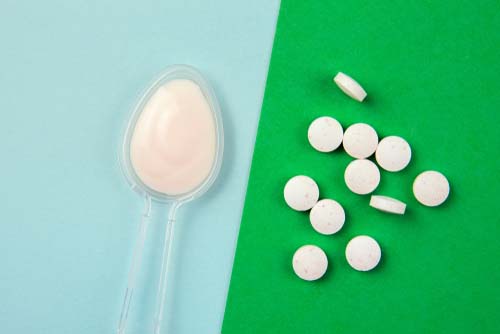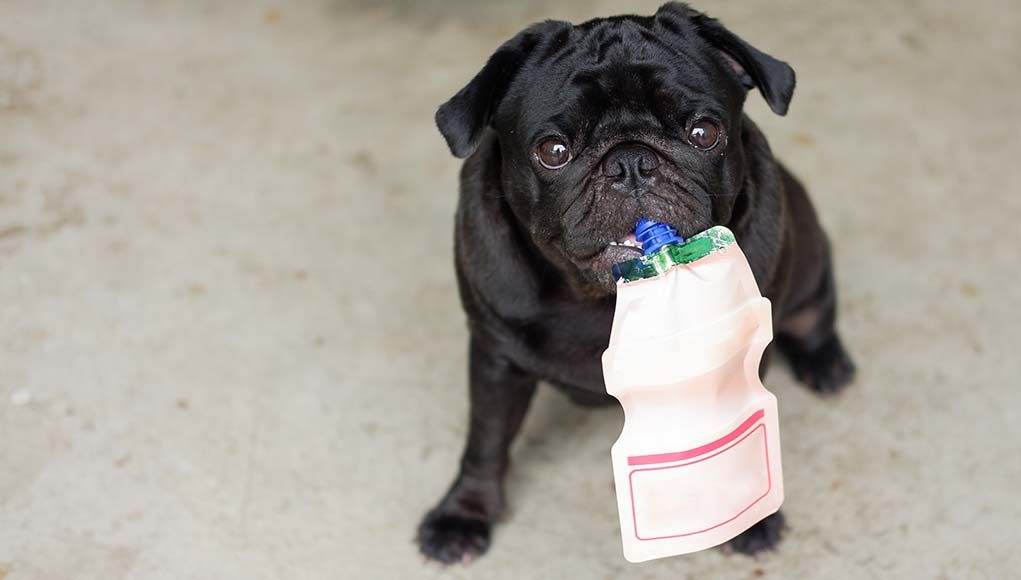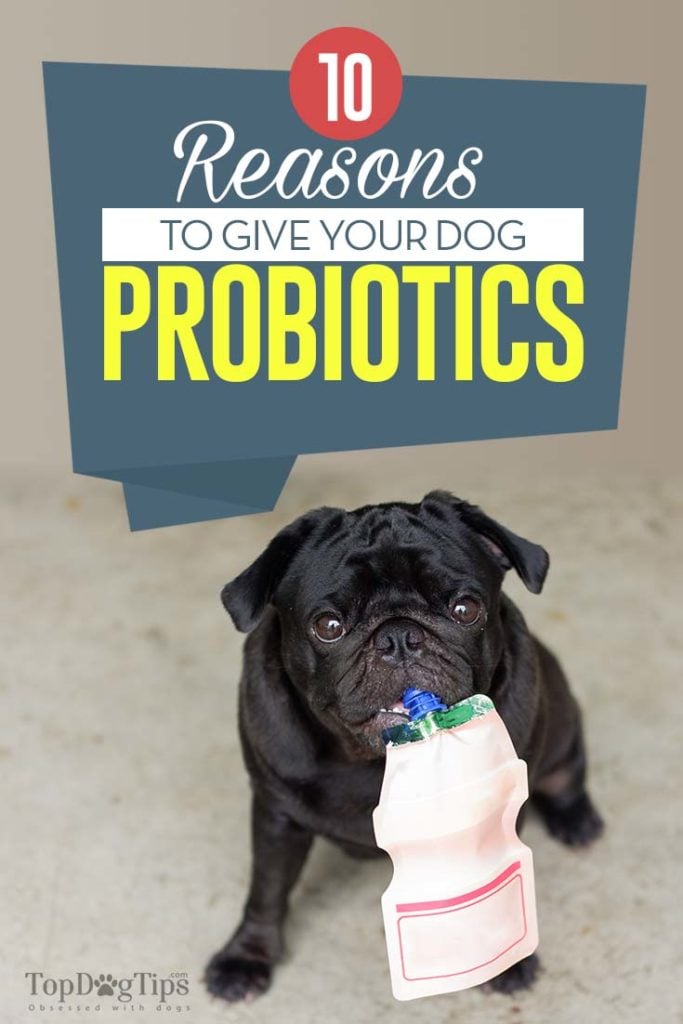The term “probiotic” is a catch-all for the substance that stimulates “friendly” gut-dwelling microbes found in both humans and animals (1). These microscopic yet significant yeasts and bacteria are numbered in the billions in a dog's gastrointestinal tract. They help aid digestion, boost the immune system, and help fight off diseases in dogs (2, 3).
Types of good bacteria found in a dog's gut include:
- Enterococcus faecium
- Lactobacillus acidophilus
- Lactobacillus casei
- Bifidobacterium breve
- Bifidobacterium lactis
When these good microbes in your dog's gut are damaged, destroyed or simply lack in numbers, the dog can experience stomach upset, gas, diarrhea, a general decline in health, have a bad breath and a weakened immune system. You can prevent this by adding dog probiotics to your pet's meals, but there are also other benefits.
10 Reasons to Give Your Dog Probiotics

1. Decrease Antibiotic Side Effects
Antibiotics fight a broad range of infections, but they will also kill the good bacteria found in the dog's stomach and intestinal tract. Your dog may experience bloating, diarrhea and general stomach upset when taking an antibiotic (4, 5).
Many studies with dogs demonstrated clear effectiveness of probiotics in decreasing side effects from antibiotics, particularly those related to dog's GI issues (6, 7, 8, 9, 10). Thus, giving a dog probiotic or synbiotic (mixture of probiotics and prebiotics) during and a few days after the medication can help ease the symptoms (11).
If you know your pooch is going to be taking an antibiotic, start a probiotic regime a week before to build up bacterial resistance and help ward off the unpleasant side effects.
2. Decrease Stomach Upset Due to Stress and Illness
Dogs that are experiencing an abnormal amount of stress (for example, when being boarded, traveling, when in a shelter, or have been relocated) can be left with stomach issues, and/or diarrhea (12).
Studies found that giving a probiotic can reduce stress related symptoms from one week to four days, particularly with dogs entering animal shelters (13).
3. Help Chronic Gastrointestinal Distress
Some pets have chronic stomach issues that may be helped by the regular and daily use of dog probiotics (14, 15). Including these in your pet's diet will encourage their stomach to create a healthy inflammatory response which will then help your pup to feel better.
4. Aid Senior Pets
Since 70 to 80 percent of the dog’s immunity cells are in the gut, giving a probiotic to a senior dog is a healthy and natural way to boost their immune system (16, 17).
Aging pets may also experience an increased risk of inflammation due to arthritic joints. A good dog probiotic can also reduce this side effect and will help your pet move more freely and experience less pain.
5. Healthy Gut Flora May Equal Good Behavior
There's a correlation between poor gut flora and aggressiveness in dogs (18). Also, dogs that aren’t feeling well may also exhibit behavioral changes due to the discomfort they're experiencing. This can result in excessive licking, scratching, and other emotional issues.
When dog probiotics are used to create a healthy gut flora balance on the inside, the animal will feel better and the negative behaviors may cease.
6. Help Ease Constipation
Dogs with constipation can suffer from gas, bloating, and stomach pain, which can also lead to lethargy, vomiting, and loss of appetite. Give your dog probiotics in conjunction with fresh water, and plenty of exercise to help get them regular again (19).
7. May Help Reduce Allergies and Skin Conditions
Because the immune system and gut health are closely related, researchers have now attributed allergies (or the immune system's misguided response) partially to an imbalance in the gut’s bacteria (20).
Providing your dog with probiotics can significantly reduce allergies – both food related and environmental – and their related symptoms such as itchy skin and rashes (21, 22).
8. Reduce Stomach Upset When Changing Food
Food changes are one of the leading causes of stomach upset in dogs. To reduce the risk, give your dog probiotics a few days before making the switch, keep including them during the switch over and a few days after your dog is on the new dog food brand.
9. Healthier Teeth
Probiotics have been proven to inhibit the growth of certain “bad” bacteria that can cause tooth decay and bad breath (23). Along with good oral hygiene, regular brushing and dental chews or toys, add a probiotic to your canine’s diet to help promote healthy teeth and gums.
10. Better Brain Health
There is a direct correlation between the intestinal microbiome and the brain’s neurotransmitters and neuropeptides which are needed for healthy function (24, 25).
Probiotics also synthesize brain hormones such as serotonin which can help improve your dog's mood and may also aid the dog in processing vitamin B-12, which is essential for proper brain function.
The Best Dog Probiotics Brands
There's two ways to give probiotics for dogs – through foods like yogurt or Kefir, and through supplements. Most pet owners will choose to use dog probiotic supplements simply because it's more convenient and also doesn't add extra calories. Below are some of the best dog probiotics in the form of supplements that we like.
| Preview | Product | Rating | |
|---|---|---|---|

|
Purina Pro Plan Veterinary Supplements FortiFlora... | 40,194 Reviews | Check Price |

|
Zesty Paws Probiotics for Dogs - Digestive Enzymes... | 37,480 Reviews | Check Price |

|
Veterinarian Strength Advanced Probiotics, Healthy... | 12,541 Reviews | Check Price |

|
Proviable Digestive Health Supplement Multi-Strain... | 12,725 Reviews | Check Price |

|
PetVitalityPRO Probiotics for Dogs with Natural... | 3,033 Reviews | Check Price |
Summary
The health of your dog’s gut will significantly impact their overall health and well-being. Veterinarians across the country are recommending probiotics to their patients to reduce the effects of antibiotic usage, stress, allergies, and food changes, as well as promoting healthy teeth, gums, and brain function.
Disclosure: We may earn affiliate commissions at no cost to you from the links on this page. This did not affect our assessment of products. Read more here and find full disclosure here.














